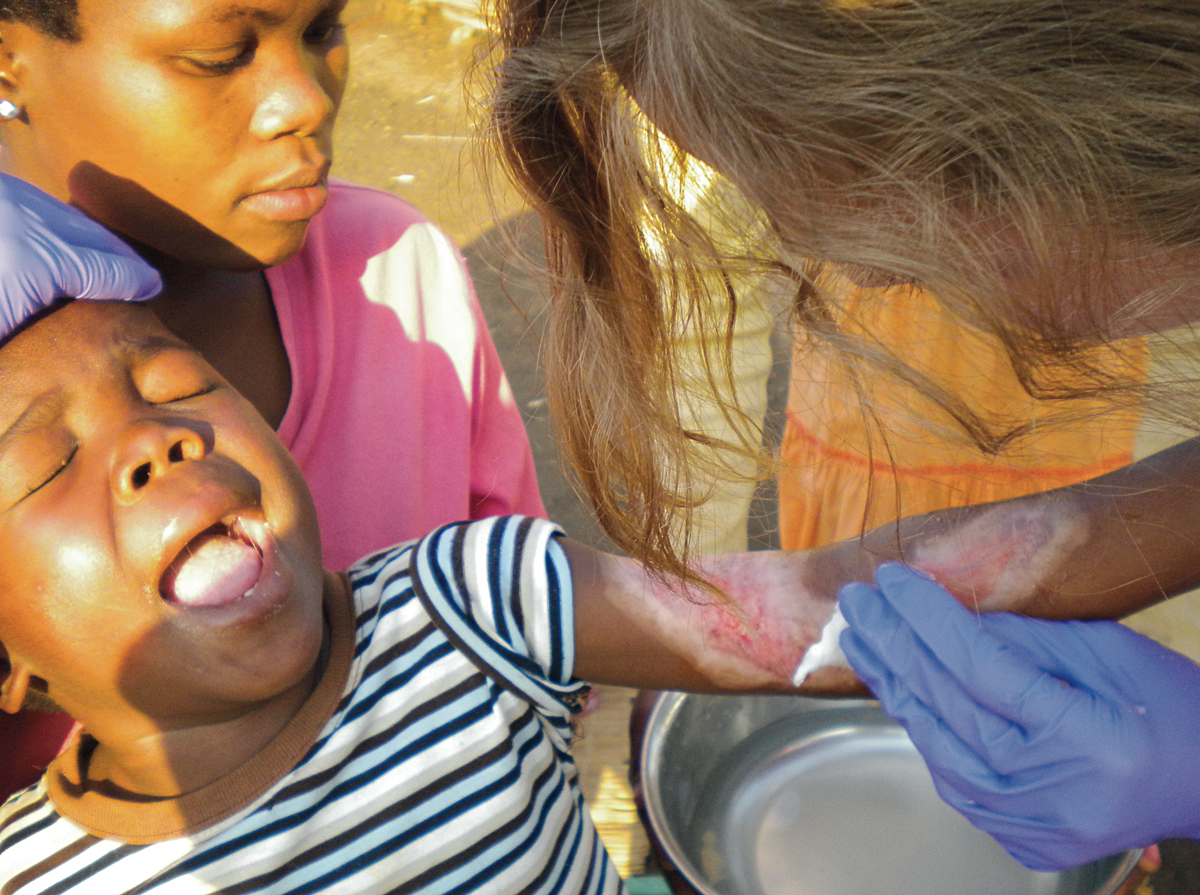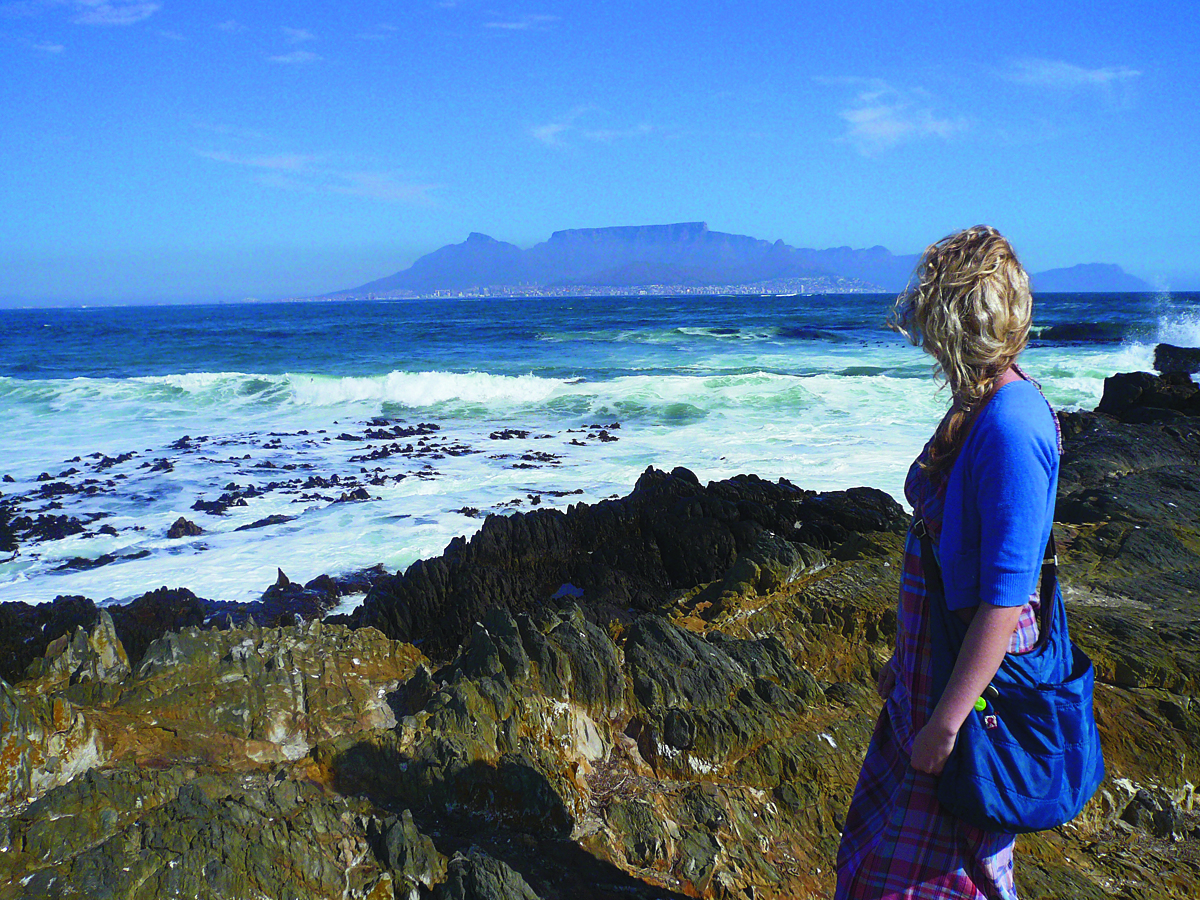Student intern Anna Brice witnesses the reality of HIV victims in Swaziland
Story by Jaimie Goldstein
Photos courtesy of Anna Brice
A five-year-old boy suffering from an infected third-degree burn, a grandmother dying from HIV, a young girl diagnosed with syphilis at age ten — these were just some of the conditions Anna Brice witnessed in the ten weeks she worked as a medical intern in rural Swaziland.
Brice, a junior majoring in history and biology at the University of Oregon, interned at a mission this past summer providing assistance to HIV-positive patients and orphaned children. Swaziland, a small country resting between Mozambique and South Africa, has a 50 to 60 percent infection rate of HIV — the highest in the world. Brice did as much as she could to help in her short time as an intern, and can’t wait to return to Africa as a doctor.
Jaimie Goldstein: How did you get involved in your internship and what interested you about it?
Anna Brice: The program was IE3 Global Internships and the site was Cabrini Ministries. There are two major components to their work. They have an orphanage where they have roughly 130 children who are mostly orphans due to HIV/AIDS. They also provide support to all of the children in the community, whether they need food, clothing, or help with paying for school. And then they also have a clinic, which is only for HIV and tuberculosis patients. And they provide home-base care for people who are too sick to make it into the clinic.
JG: Do the orphans know their parents died from the disease?
AB: All of these kids have at least one parent who has died — most likely from HIV. The king of Swaziland is basically in denial that there is such a thing as orphans because aunts and uncles are considered mothers and fathers as well in Swazi society. You have many parents. But the thing is, when there’s so much poverty and you go to live with your aunt and uncle, they’re not going to feed you before their own children. And when there’s limited food resources, then these kids starve, these kids don’t have shelter, these kids are abused.
JG: What was it like to work with HIV-positive patients?
AB: Well, it was a lot easier than I expected. Actually the hardest part about it is coming back here because while you’re there, you’re in the moment. You have to do what you have to do to help someone, and everyone there understands what you’re going through, and everyone there understands the difficulties. It’s hard to come back and convey how difficult it is to look at a five-year-old boy and know that he’s not going to live more than ten more years. So, over there at least, I felt like I was doing something about it: I was helping these kids, I was working with the patients, I was treating wounds, I was doing things to help. But here, since I came back, I feel almost helpless. You know, they’re still there; they’re still sick.
JG: How did you spend the majority of your time in Swaziland?
AB: The first six weeks I was there, I was teaching . . . and then the last four weeks, when the kids went on their breaks to go home, I worked a lot more with the clinic. There was a young boy who was five years old and HIV positive. He got a third-degree burn from a pot of boiling water that one of the older boys had tossed out the window while doing dishes. Every morning I would drive to his homestead and clean his wound. It was awful. Because it was septic, I had to scrub it until it bled to help it heal. He would scream and hate me. But every day I drove up to his homestead, he would walk out and just put his arm out. He wouldn’t run away, he wouldn’t fight it. He was the strongest little boy. That would be the first thing I did in the morning.
Not a lot of people there can drive because no one can afford cars and they’re all stick shifts, so I would drive one of the nurses out to the homesteads for patients who are too ill to come into the clinic. There was a grandmother on a homestead who was so weak and very sick and she couldn’t move. She was just stuck in her bed. And because of that, she had gotten one of the biggest and deepest bedsores I’ve ever seen. It was probably two-inches deep, and probably the size of a donut, on her right hip. But the thing is, she can’t move, she can’t leave her bed, she’s too weak . . . she was in absolute misery. And the only thing we could really do for her was give her food — she couldn’t even sit up. We had to hold her head to feed her. So I would do everything from giving people their daily injections, cleaning wounds, giving people medication [and] driving people to hospitals.
JG: Do you think Americans react differently to someone infected with HIV than Swazis?
AB: [HIV] is extremely common . . . the entire nation is affected by this. But there is a huge stereotype that comes with being HIV positive. Very few people live openly with it, which, in part, contributes to the problem because then you don’t know your partner’s HIV positive; the chances of you contracting it [are very high]. Nobody calls it HIV over there. It’s called “the disease.” So if somebody just says, “I’m sick,” you know that means HIV. It’s treated a lot like it is in the States, only it’s more common. The problem with it also isn’t education; Swazis know more about HIV than anybody else I’ve met. They know how to protect themselves; they know how to stay safe. They know these things. But it’s just that their culture doesn’t abide by those same rules and so there’s just a massive conflict. They know that they’re putting themselves at risk, but they continue to do it because that’s their culture.
JG: What efforts are being made in Swaziland to control the disease?
AB: There’s a lot of effort to control. They put a lot of effort into showing by example. Also, they try tactics like female condoms, so that it’s not necessarily up to the male if you have protection or not. But then again, if a man isn’t going to want to wear a condom, he’s not going to be all too happy that she’s wearing a female condom. So there’s a lot of work put into supporting the women. Because a lot of times girls, young girls, start having sex because older men will offer them food or gifts in return for sex. And when you’re starving, you can die in three years of HIV, or you can die tomorrow of starvation. A lot of effort is put into just giving people the basic needs: giving them food, giving them shelter, making them feel like a person so that they’re less susceptible to older men or dangerous situations.
JG: Were there gender disparities in Swaziland?
AB: People refused to get in cars with women. I’d drive up to a homestead with a male nurse, [and] he’d get out of the car and everyone would just start laughing on the homestead and cracking up. And everything was said in SiSwati [the national language]. He’d be very embarrassed and it’d be awkward. We’d get back into the car, he’d take the keys from me, hop in the driver seat, and he’d say, “OK, let me just drive down a few meters until they can’t see us,” because he would be so embarrassed about them laughing at him.
JG: They were laughing because you were a woman driving?
AB: Yeah.
JG: What was the most challenging experience for you while there?
AB: The only time I felt physically ill the entire time I was there was when a man came in — he was HIV positive and he had syphilis. We gave him the injection. About an hour later, he came back with his ten-year-old daughter, who was, that day, diagnosed with syphilis. And there are stories. Right before I got there, there had been a seven-year-old who raped his four-year-old sister. How does a seven-year-old learn to rape a four-year-old?
JG: What do you wish you had done more of while you were in Swaziland?
AB: Everything — I wish I could have had more time with the kids, started to form relationships sooner, spent more time in the community. There’s always something more I wish I could have done. But I am happy with the work I was able to do.
JG: How do you think this experience has shaped your future?
AB: I am more confident than ever that I want to be a doctor.
JG: What kind of doctor?
AB: I don’t know yet. But I want to go back to Africa.
JG: Swaziland or Africa in general?
AB: Just Africa in general. Wherever I can do the most to help because in Swaziland I don’t speak SiSwati. In order for me to help people, I would need somebody there translating. I just want to go somewhere that I can actually make a difference. And I don’t want to go back to Africa until I’m a doctor because being there this summer was great and I felt like I could help, but I couldn’t do a lot. So if I go back trained as a doctor, there’s so much more that I could do to help.
Categories:
Driven to Medicine
January 3, 2011
Driven to Medicine
0
Donate to Ethos
Your donation will support the student journalists of University of Oregon - Ethos. Your contribution will allow us to purchase equipment and cover our annual website hosting costs.









